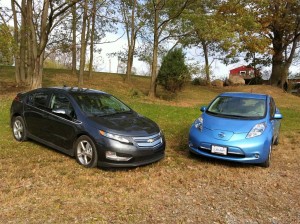
The White House wants to make rebates for battery cars like the Chevy Volt and Nissan Leaf available at the time of purchase.
Despite near-record fuel prices, Americans have yet to make a significant switch from gasoline to electric propulsion, whether in the form of conventional hybrids or battery-electric vehicles.
So far this year, in fact, advanced electric vehicles, like the Nissan Leaf and Chevrolet Volt, have generated barely 2,000 sales, barely two days production of a vehicle like the big Ford F-150 pickup.
The Obama Administration hopes to switch on demand, however, by offering dealer-based incentives — much like the givebacks automakers routinely use to boost sales – rather than the current tax credit system that can take a buyer as much as a year to receive.
“We’d like for people to get a $7,500 rebate on the day they buy the Leaf,” said U.S. Transportation Sec. Ray LaHood, during a visit to the Nissan plant in Smyrna, Tennessee that is being retooled to start building the Nissan Leaf.
Traditional automotive incentives are provided up front so that buyers can use them to reduce their down-payments and monthly notes. And by using the same approach for advanced battery vehicles, said LaHood, it would permit customers “to own a Leaf for what most average people can afford.”
The Leaf lists for more than $30,000, but after the federal tax credit, that price drops to around $25,000, closer to what the average American automobile will go for this year, according to industry data. The vehicle – and other battery cars, like the Chevy Volt – may also qualify for state and even local incentives. It is theoretically possible for a suburban California resident living in the right community and working for one of several movie studios offering battery car incentives to ultimately wind up paying as little as $12,000 for the Leaf.
But the current system means the customer must wait for much of that to come in the form of tax credits when next filing a return. A buyer purchasing a qualifying vehicle in January 2011 might not see that money again until well into 2012.
LaHood said he is hoping that the shift in the battery-car incentive program will be included in one of the many tax bills being considered over the next 18 months.
The Administration and Capitol Hill battery-car proponents would also like to expand the number of battery cars that could qualify for a federal rebate – whatever the form.
That won’t matter for the moment, it appears. The two big battery car previews of 2011 haven’t exactly charged up the market. Both Leaf and Volt have so far generated barely 1,000 sales each, despite plenty of positive headlines and claims by the two makers that they had signed up thousands of so-called “hand-raisers.”
But that may not be as worrisome as it might initially appear. Both General Motors and Nissan have taken a cautious approach to the initial roll-out of the Volt and Leaf to ensure they get the new technology right – and Nissan still faced an unexpected electrical problem with some early vehicles.
The Japanese natural disaster of March 11 also complicated matters, though Nissan is pushing to build up production levels in the coming weeks and soon hopes to have enough vehicles in its showrooms to meet the demand. A story in Automotive News projects that sales of the Japanese battery-electric vehicle should reach 10,000 this year — though the maker initially projected a first-year figure closer to 20,000.
Nonetheless, Nissan believes demand will steadily grow and is putting in place the capacity – along with its French alliance partner Renault — to produce over 500,000 Leafs and other battery vehicles by mid-decade.
During his visit to the Nissan plant, Sec. LaHood said the White House also is committed to funding a nationwide expansion of public charging stations, something a senior executive with the Japanese maker agreed is critical in boosting acceptance of the technology among the American public.

The auto companies, if given the rebates up front, must absolutely do a better job of advertising the electrics in the media to inform the public of their capabilities. Right now, it seems that GM is letting Nissan drive the electric car ads, to their detriment. Most folks theorize that the Volt is similar to the Nissan except more expensive. Most folks figure that the Volt has the same limited range and the same charging drawbacks as the Leaf. Chevy has absolutely got to start doing head-to-head comparisons, showing that while the Leaf is strictly a mall-hopping urban car, the Volt can tale you cross country. This is subjective, but the Leaf is butt-ugly compared to the Volt. I see Chevy is finally ramping up production of the Volt, and I hope that they are ramping up a similar advertising campaign in support of the Volt. The Volt is especially in position to siphon off sales of the Toyota Prius right now, as are the light-hybrids that GM is readying for sale. This is no time for GM to be timid, or tardy to the market.